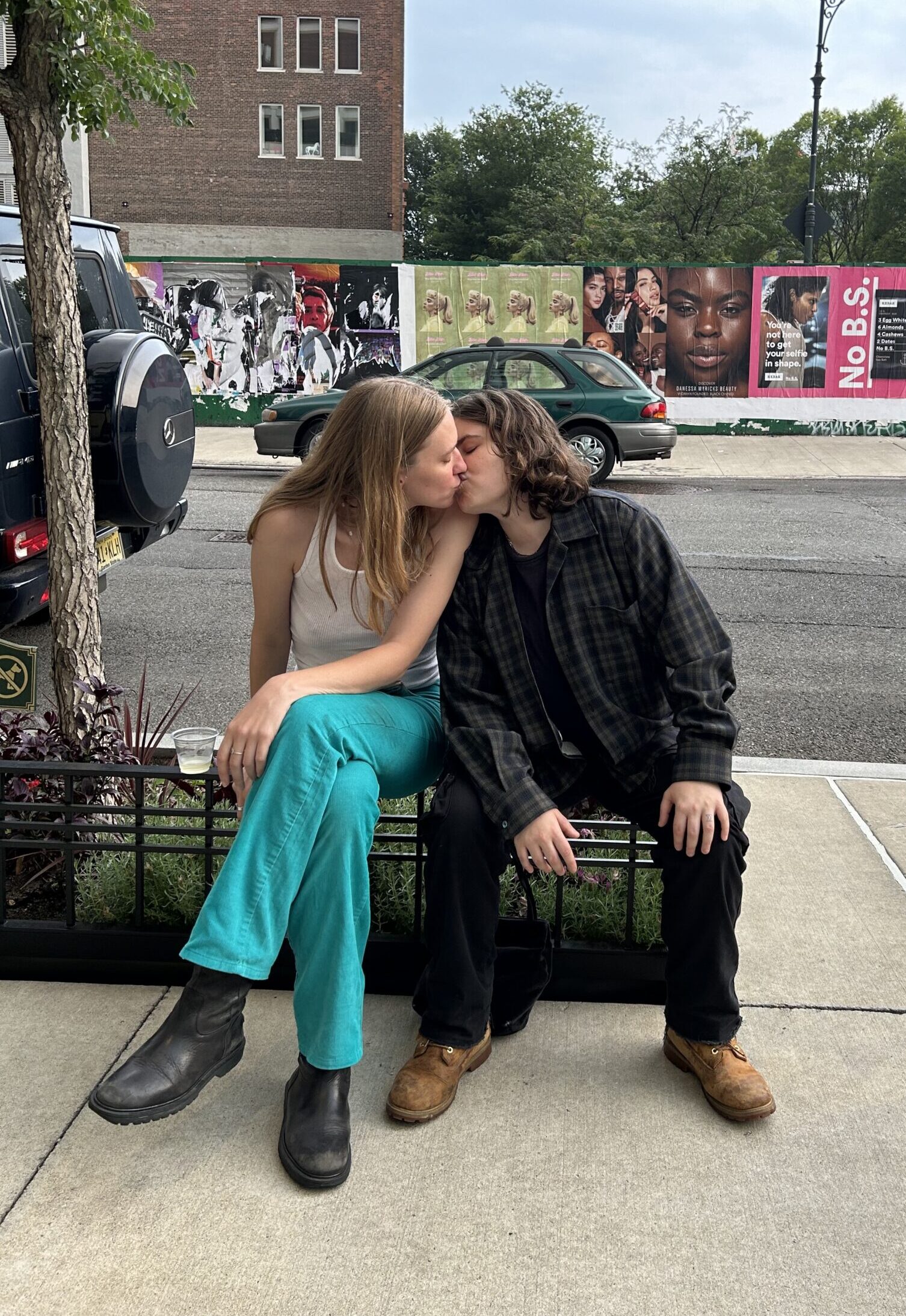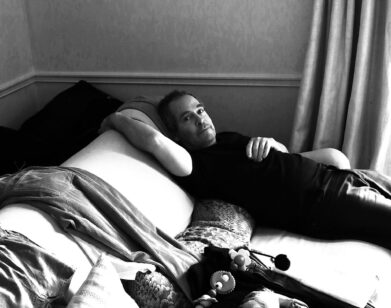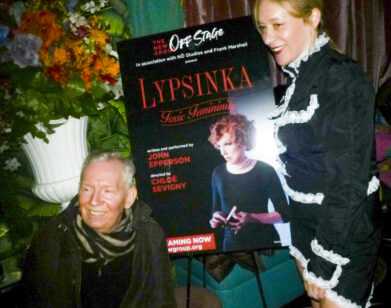POET
Riley Mac and Coco Gordon Moore on Poetry, Nose Drugs, and Nostalgia
The first time I met Riley Mac was at a poetry reading at KGB Bar. After she read, I knew two things to be true. The first was that I needed to read her work and attend every reading she was in. The second was that I wanted to have sex with her. That’s what her poetry does to you. It makes you yearn, it makes you want to cry, to indulge in any extreme. The destruction and charisma of her writing is overwhelming to the heart. We fell in love many months after that first meeting at KGB. We now live together, and Riley just released her first book of poetry, In This Car.
———
RILEY MAC: Hi, Coco.
COCO GORDON MOORE: Hi, Riley. I’m so excited to be talking to you about your new book In This Car. How do you feel about me interviewing you? Does it make you nervous?
MAC: I’m nervous about this type of thing no matter what, the fact that it’s you makes me feel less inhibited.
GORDON MOORE: Yay. Well, I’ll start with a simple question, why title your chapbook In This Car? Were there other titles you were considering?
MAC: So In This Car was my initial instinct, but I went through a phase of wanting the title to be Apology Tour. But I realized that was goofy, these poems aren’t all apologies, so I went with my gut.
GORDON MOORE: I feel like In This Car evokes teenage nostalgia, which there’s a lot of in your book. It’s like a road trip. There’s a lot of drug use going on, which can be fun, but also bad. You’ve created this persona of someone we really want to hang out with, but then as we continue reading it, we’re glad that’s not us, because it’s also extremely tragic what happens in these poems. You’re not glorifying drugs at all. In fact, you don’t really mention what drugs you’re doing.
MAC: I definitely wasn’t writing these poems from a point of like, “Let me flex on all the drugs I’m doing.” That’s its own genre of poetry, and good for those people. It must be nice, I wish I could do drugs recreationally. I’m jealous of them. That’s why I’m such a hater about that type of poetry, for the record.
GORDON MOORE: Yeah.
MAC: I’ve been sober for, as you know, a year and three months. But I wrote pretty much all these poems in active addiction, so where my head was at was like, “I have delusions of grandeur. I’m a drug addict. I think I have it all figured out, but I know I don’t have it all figured out and I’m suffering.” The title is also a testament to that period of my life. I always found myself balls-to-the-wall high in my car, because for a while, I was delivering drugs full-time to all the girls and gays in Bushwick. It wasn’t some tough guy thing. Mostly it was just really good money, but obviously that was a large part of my downfall.
GORDON MOORE: I really like the way this book flows, there’s a lot of rising and falling. It’s hard to get to a stillness in the book. I feel like when you’re reading something like this you’re almost waiting for the voice to find a moment of clarity, but it doesn’t really happen.
MAC: Yeah. There’s definitely moments of me trying to grasp for clarity. I was experimenting with sobriety here and there, but failing to do so. But I think I guess I consider the climax of the book to be this poem called “High From Heaven,” which is one of the few poems where I’m not deflecting and trying to make a joke of my life, but where I’m actually admitting defeat.
GORDON MOORE: That poem’s probably one of my favorites. Do you have a favorite poem in this book?
MAC: My favorite poem is one of the shorter poems called “Aerials in the Sky,” it’s the only poem that is explicitly about my dad. I think it’s a crass, funny, little poem, but if I’m being honest, I’m scared of my extended family reading it because I think they’d probably find it disrespectful, because he’s no longer with us. He was an addict, but my dad had a good sense of humor and would probably be a little mad, but like it.
GORDON MOORE: Obviously I didn’t ever meet him or know him, but I feel like from what you’ve told me about him, he would really like that poem.
MAC: Yeah. There’s an undercurrent in the book I think about self-fulfilling prophecy and destiny or whatever, and I think familial ties have a lot to do with that.
GORDON MOORE: I like that you don’t make it so blatantly clear, but it’s there. Because sometimes you’re reading a book and someone’s talking about a fucked up character that can’t get their shit together, but they’re like, “My mom was an asshole.” But you don’t really do that, you just reference your dad in this way that’s like this un-dealt with piece of information.
MAC: I feel like, if anything, I mythologize him more in my writing, just because he passed away when I was 22, but I hadn’t seen him since I was 18. We actually talked on the phone for three hours a week before he died, which is something that we never ever did. So it was one of those, like, he passed away and I felt like I never really got to know him as an adult. So he just exists in memory and in mythology, for lack of a better word. We had the addiction connection, and we had a lot of hobbies and interests in common, although he didn’t raise me. So it’s definitely something I try to force myself to explore, because when I compartmentalize it, I get weird.
GORDON MOORE: All right, I’ll move on to a less heavy topic. I know you love horror movies. Do you have a favorite horror movie or horror movie franchise?
MAC: I’m a big Rob Zombie Stan.
GORDON MOORE: You reference him in one of your poems.
MAC: I know. I wanted him to blurb this book, but it didn’t happen.
GORDON MOORE: Next one.
MAC: Ginger Snaps isn’t scary, but it has the horror aesthetic. I love Funny Games, I love the original The Texas Chainsaw Massacre.
GORDON MOORE: We love a final girl.
MAC: I love a sexy final girl. You’d make a good final girl, Coco.
GORDON MOORE: Oh, thank you. Maybe I’ll try to make that happen.
MAC: Half-naked and covered in blood.
GORDON MOORE: Perfect. Who are some poets you’re reading that you’re really into right now?
MAC: I’m really not reading a ton of poetry right now. I would say that my favorite poets are friends, and you. You’re one of my favorite poets, Carson Jordan is one of my favorite poets, Montana James Thomas is one of my favorite poets. Because you read poetry sometimes and you’re like, “This is the best you’ve got?” I think when I feel in a rut I definitely just whip out some Rene Ricard and read that, because I’m like, “This is my shit.”
GORDON MOORE: Yeah, Rene Ricard is dope. I feel like you guys have a very similar vibe.
MAC: I hope so, I like him.
GORDON MOORE: Well, back to your book, something that I have written down is, “Lots of self-flagellation.”
MAC: We love self-flagellation.
GORDON MOORE: I said, “Lots of self-flagellation, but with a smirk.” The “I” in this book isn’t a hero, but protects and holds love and romance and girls so gently. You give a lot of care to people in this book, and to all the places you’ve been to, like you mentioned L.A., Jersey, New York, Miami, Tulum. But there’s very little care given to the self. It goes back to the teenage-dom thing also. You have so much care for the lore of teenage girls.
MAC: The lore of teenage girls, that’s cool. That’s a generous read. I think I’ve just always held romance, love and I guess sex or eroticism to a very high regard. Maybe over success and money, my pursuit of love has always prevailed.
GORDON MOORE: Yeah. What do you think your obsession with teenage-dom is though? You have a whole poem in there called Every …
MAC: Everyone on Earth is a Teenage Girl? Well, I was definitely in my Sofia Coppola bag when I wrote that poem in particular.
GORDON MOORE: She definitely likes teenage girls.
MAC: I’ve thought about my fascination with teenage girlhood, and I can’t quite put my finger on what it is to be honest, because I was never really a teenage girl. I was never a traditionally feminine—surprise-surprise, teenage girl. I was always me. But I think teenage girls are slept on. I don’t think they get the credit that they deserve. I think that I revere the lust for life that a teenager has, and I respect it and I respect the untainted wisdom of a teenager.
GORDON MOORE: Do you think you’re a teenager?
MAC: I do. I think I try my best, for better or for worse, to push back on adulthood. Probably the cons outweigh the pros if I’m being completely honest. I think you’re a teenager.
GORDON MOORE: I’m a teenager. Look at our apartment.
MAC: We’re teenage adults.
GORDON MOORE: Yeah.
MAC: Good.
GORDON MOORE: Let me look, let me look at what else I have. Do you want to talk about the poetry readings you host?
MAC: Yeah. I’m taking a break right now. People start to get on your nerves after a while. If you love something and you start to hate it and it starts to feel like a job, you’ve got to fucking take a step back.
GORDON MOORE: It’s true. I always like the ones you host, but I understand. You’ve got to find a new spot.
MAC: I do.
GORDON MOORE: Maybe Manhattan-based.
MAC: Exactly, because we just moved to Manhattan. I don’t want to go to Brooklyn if I don’t have to go to Brooklyn.
GORDON MOORE: Probably my favorite thing about this book is the ending, the last poem. Well, it’s not my … No, I love the last poem. “High From Heaven” is maybe my favorite one, but I love how depressing the ending is, because there’s not really a conclusion. The last poem is technically sober, the last line, in the sense that “No Nose Drugs in Miami.”
MAC: Oh, you’re talking about “No Nose Drugs,” I thought you were talking about the Voicemail. Oh, you’re talking about No Nose Drugs. I got it, I got it.
GORDON MOORE:
The last actual poem is “sober,” but it’s clearly not the end. The person clearly doesn’t want to stay sober, even though in this last poem they’re trying to.
MAC: I’m drinking alcohol that whole poem.
GORDON MOORE: You are, yes. Your drug sober.
MAC: I’m just not doing drugs, so I think it’s okay.
GORDON MOORE: But yeah, there’s this journey you take us through and we’re left concerned, worried, no one is saved or healed. I just thought that was cool.
MAC: Yeah, thanks.
GORDON MOORE: Then we get to the Voicemail, which is a very interesting thing that you add on. Do you want to … I know you probably want it to be a little bit of a fun surprise at the end, I don’t want to give too much away, but if you want to talk about it at all.
MAC: I guess the last piece of writing in the book is not a poem, it’s a voicemail transcript. It’s the only found text in the book. I didn’t have any ambition towards putting any found text in the book until I received a voicemail from a blocked number from a voice that I did not recognize. There’s something really chilling about receiving a voicemail where someone clearly fucking hates your guts, and no one knows who the voice is. It was probably by design. But it was someone who was very upset with me, thinks I’m morally wrong, and decided to leave me a voicemail about it. So I put it in the book because I felt like it fit the trajectory of the story I was telling, and also because it spooked me out, so it felt like a reclamation.
GORDON MOORE: No, I think it was interesting. It’s a little bit of an outing yourself. You are the creator of how we see you in your life in these poems, and then you put this voicemail in the end and it’s like, “And this is how someone else saw me.”
MAC: Exactly. The delusions of grandeur have been humbled.
GORDON MOORE: Your favorite phrase.
MAC: Yes, exactly.
GORDON MOORE: Okay. My last question is, who is your celebrity crush?
MAC: Don’t embarrass me, because you know what I’m going to say.
GORDON MOORE: You can say it.
MAC: So my celebrity crush growing up was Chloe Sevigny, who people say you look like. So, check, manifested that, bitch. But my current celebrity crush—
GORDON MOORE: I feel like you have a few.
MAC: You know who my celebrity crush is. Who is my celebrity crush?
GORDON MOORE: Sydney Sweeney.
MAC: Sydney Sweeney, I can’t help it. I know that’s the most basic answer in the world, but it is what it is.
GORDON MOORE: It’s okay, she’s fun.
MAC: She’s beautiful.
GORDON MOORE: I guess that’s all my questions for you. I love you so much.
MAC: I love you too. This is such a blast.
GORDON MOORE: Yay. Now we can kiss.
MAC: Alright, let’s make out. Bye.








